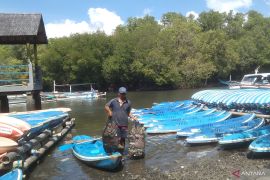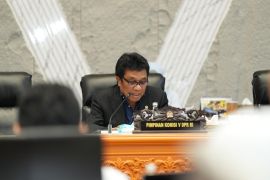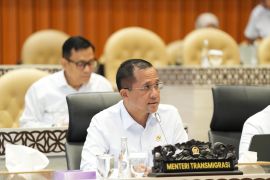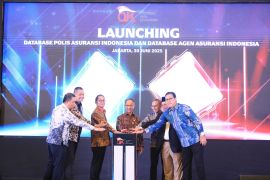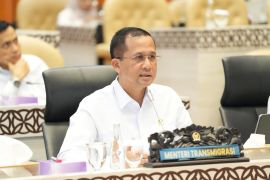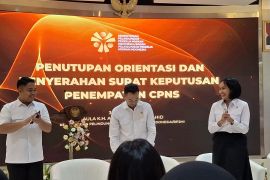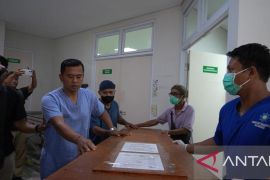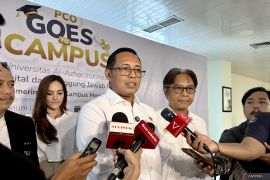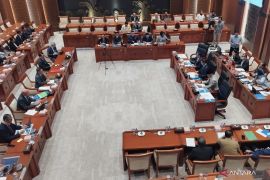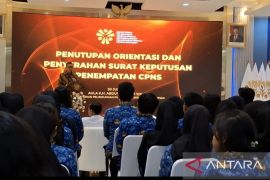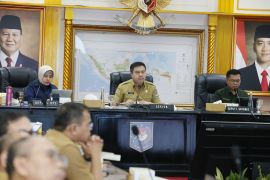The principles contained in blue economy can strengthen the food resilience and economy to achieve a sustainable growth. "In the future, MMAF is looking forward to arrange the other implementation programs, so that the blue economy can be practically implemented in managing the marine and coastal areas," he continued.
This is a serious form of the Government of Indonesia in an effort to create a sustainable growth so it can establish the balance between economy and business activities supported by environment equilibrium. Moreover, Indonesia is as the world's largest archipelagic state become the expected country to contribute in sustainable development experience.
In addition, state leaders and government officials who attended in this event expressed their commitment to focus on the environment-based marine and fisheries development. During this time, Indonesia has given much attention to land, whether it is from development sector or climate change solution. However, it has not fully explore the potential of marine and coastal to achieve a sustainable growth with justice value as well as addressing the impact of climate change.
Study results shows that marine and coastal areas can provide the contribution to global warming mitigation. The ocean absorbs more than 80 percent from excess heat, and if supported by appropriate technology they can be alternative energy source. Indonesia itself has submitted the blue economy proposal in Rio+20 Forum to boost global awareness for sustainable marine and coastal resources management. He explained the blue economy has a potential to new development paradigm by implement the new business development which synergy between growth, development and environment.
Indonesia is very ideal to apply the concept of blue economy. It is because most of country's area consists of maritime, with incredible ocean wealth. If the Natural Resources can be well-managed along with the implementation of blue economy principles, the economy of Indonesia is expected can be more powerful. Furthermore, Indonesia will adopt the "blue economy" concept soon, looking to the trend in the future of post-implementation from "green economy" concept. "A country as much as Indonesia needs green economy, but as the world's largest archipelagic country, to implement the green economy will not enough and it needs to get along with blue economy concept," Sharif explained.
Moreover, the economic potential of marine in Indonesia is estimated to reach US$ 1,2 trillion per year or equivalent with ten fold of 2012 State Revenue and Expenditure Budget. Therefore, the government continues to promote the blue economy in each development plan in Indonesia. Blue economy can be seen as an action based on comprehensive economy development for people to achieve the overall national development. Blue economy-based development approach will synergy with the implementation of "triple track strategy, programs of pro-poor (poverty elimination), pro-growth (growth), pro-job (work force recruitment) and pro-environment (preserve the environment).
One of concrete movements from the Ministry of Marine Affairs and Fisheries to implement the blue economy including through Coral Triangle Initiatives (CTI) program. This serious form is particularly reflect in coastal and coral reef ecosystem management in Coral Triangle including Indonesia, Malaysia, Philipines, Timor Leste, Papua New Guinea, and Solomon Islands. Blue economy began to apply through coral reef conservation.
For information, Coral Triangle Initiatives Conference in 2009, the leaders of state members of coral triangle has approved five action plans. First, to strenghten the management of processed high ocean, and second was to promote the ecosystem approach of fisheries management. Third, increasing the effective management from marine protected areas and fourth was to enhance coastal people resilience to climate change and natural disaster. Last, the effort to protect endangered species.
Rio+20 Conference attracted the world attention, it can be seen from 192 government representatives including 100 heads of government, environmental activists, and various organization has attended this conference on sustainable development. The Minister of Marine Affairs and Fisheries also attended Indonesian side event titled "Towards a Green Economy Transition in Indonesia" themed "Together We Must Create The Future We Want".
In addition, Sharif also had the opportunity to lead a side event of Coral Triangle Initiatives (CTI) in Rio+20 Forum. The theme is toward the green economy. This event has officially opened by Minister of Marine Affairs and Fisheries, Sharif C. Sutardjo and attended by the speakers from five CTI-CFF country's members, such as the Prime Minister of Solomon Islands, Minister of Natural Resources and Environment of Malaysia, Deputy Minister of Department of Environment and Natural Resources of Philipines Republic, Deputy Minister of Environment and Natural Resources of Papua New Guinea Government, Deputy Minister of Economy and Development of Democratic Republic of Timor Leste.
For further information, please contact Indra Sakti, SE, MM, Head of Data, Statistic and Information Center, Ministry of Marine Affairs and Fisheries (Mobile: 0818159705)
Reporter: Okta
Editor: PR Wire
Copyright © ANTARA 2012
